
Doidae is a family of Lepidoptera first described by Julian P. Donahue and John W. Brown in 1987. Species in Doidae had previously been placed in the Arctiidae, Lymantriidae and the Dioptidae.
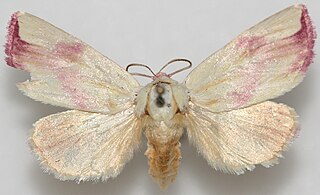
Thurberiphaga is a monotypic moth genus of the family Noctuidae erected by Harrison Gray Dyar Jr. in 1920. Its only species, Thurberiphaga diffusa, was first described by William Barnes in 1904.

Apamea vultuosa, the airy apamea, is a moth of the family Noctuidae native to North America.

Euxoa adumbrata, the sordid dart, is a moth of the family Noctuidae. The species was first described by Eduard Friedrich Eversmann in 1842. In North America it is found across northern Canada from Quebec to western Alaska, south to the northern parts of the United States, and in the mountains to Colorado. It is also found in Greenland, the coastal areas of Scandinavia and the Ural. It was recently recorded from Denmark, although this includes Euxoa lidia, which some authors regard to be a valid species.

Lobophora magnoliatoidata is a moth of the family Geometridae first described by Harrison Gray Dyar Jr. in 1904. It is found in western North America in Alberta, British Columbia, Yukon, the Northwest Territories, south through Washington to California.

Heterocampa is a genus of prominent moths in the family Notodontidae. There are about 18 described species in Heterocampa, found in North, Central, and South America.
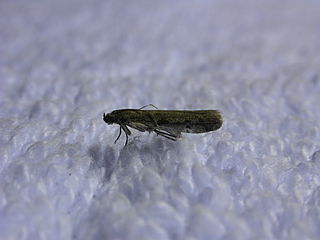
Phycitodes reliquella is a moth of the family Pyralidae described by Harrison Gray Dyar Jr. in 1904. It is known from North America where it is widely distributed in the east, including Alabama, Arkansas, Connecticut, the District of Columbia, Florida, Georgia, Illinois, Louisiana, Massachusetts, Maryland, Maine, North Carolina, New Hampshire, New Jersey, New York, Ohio, Oklahoma, Pennsylvania, South Carolina, Virginia and Ontario.
Actrix is a snout moth genus in the subfamily Phycitinae. It was described by Carl Heinrich in 1956. It contains two species: Actrix nyssaecolella, which was originally described as Tacoma nyssaecolella by Harrison Gray Dyar Jr. in 1904, and Actrix dissimulatrix.
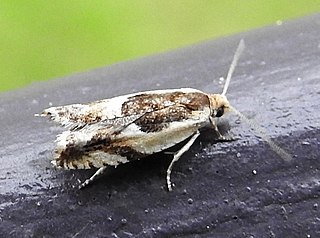
Ancylis discigerana, the birch leaffolder or yellow birch leaffolder moth, is a moth of the family Tortricidae. It is found in north-eastern North America.
Barberia is a genus of snout moths. It was described by Harrison Gray Dyar Jr. in 1905 and contains the species Barberia affinitella. It is found in the southern United States from California to Texas.
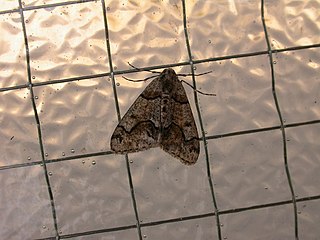
Gabriola dyari, or Dyar's looper, is a moth of the family Geometridae first described by Taylor in 1904. It is found from the Alaskan panhandle and British Columbia to California. The habitat consists of coniferous forests.
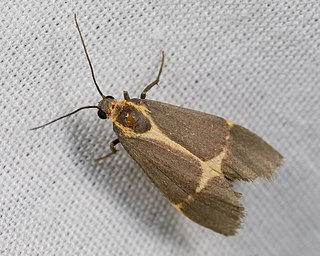
Cisthene barnesii, or Barnes' lichen moth, is a moth of the family Erebidae. It was described by Harrison Gray Dyar Jr. in 1904. It is found in the US Rocky Mountain region, from southern Montana and western North Dakota to the border with Mexico in Arizona and New Mexico. The habitat consists of dry bunchgrass steppe.

Apatelodes pudefacta, the pudefacted apatelodes moth, is a moth in the family Apatelodidae first described by Harrison Gray Dyar Jr. in 1904. It is found in the US state of Arizona and Mexico.

Paleacrita merriccata, the white-spotted cankerworm moth, is a moth of the family Geometridae. The species was first described by Harrison Gray Dyar Jr. in 1903. It is found in eastern North America, where it has been recorded from central Illinois, eastern Missouri, west-central Mississippi, Louisiana and eastern Texas.
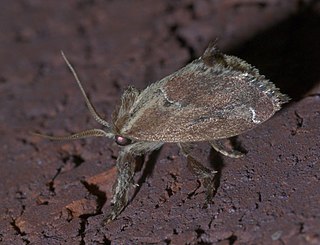
Adoneta is a genus of moths in the family Limacodidae. The genus was erected by James Brackenridge Clemens in 1860. There are at least four described species in Adoneta.

Drepanulatrix hulstii is a species of geometrid moth in the family Geometridae. It was described by Harrison Gray Dyar Jr. in 1904 and is found in North America.
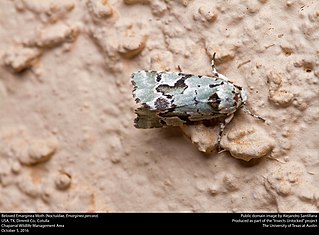
Psaphidini is a tribe of owlet moths in the family Noctuidae. There are at least 40 genera and at least 90 described species in Psaphidini.
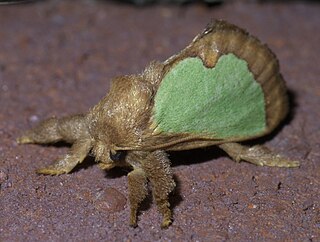
Euclea is a genus of moths in the family Limacodidae. The genus was erected by Jacob Hübner in 1819. There are at least 40 described species in Euclea.

Nemoria darwiniata, the Columbian emerald, is a species of emerald moth in the family Geometridae. It was first described by Harrison Gray Dyar Jr. in 1904 and it is found in North America.
Psaliodes fervescens is a species of moth in the family Geometridae first described by Harrison Gray Dyar Jr. in 1920. It is found in Central America.
















